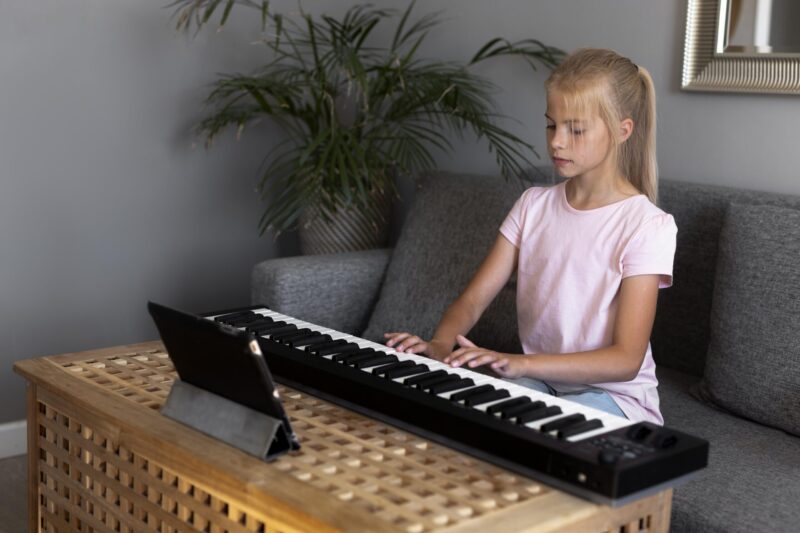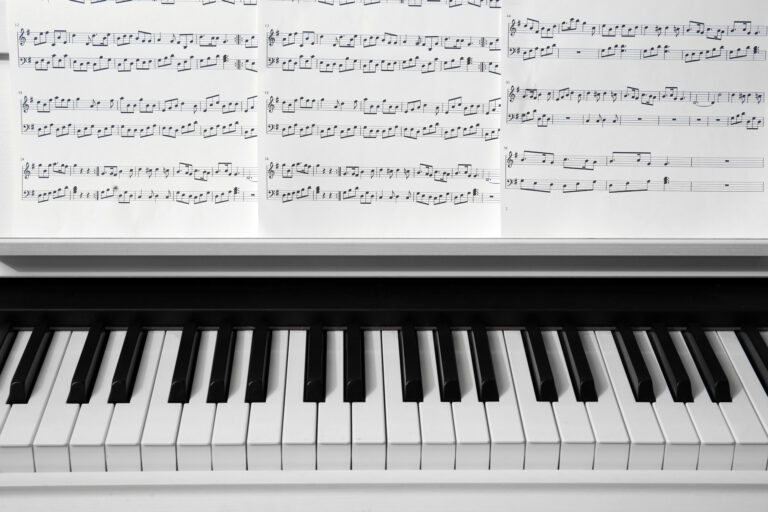Unlocking the Power of Piano Playing. Can it Improve Focus and Concentration?
Do you find yourself struggling to stay focused while studying or working? If so, you’re not alone. But what if we told you that playing the piano could be the key to unlocking your concentration abilities? Recent studies suggest that piano playing can improve focus and cognitive function, making it a valuable tool for those looking to increase productivity.
Playing the piano requires a high level of mental focus and attention. From reading sheet music to coordinating your fingers and keeping time, the multitasking involved in piano playing can help improve your ability to concentrate and stay focused on a task, even when distractions arise.
But that’s not all – playing the piano has also been shown to have a positive impact on cognitive function. Regular practice can enhance memory, language skills, and spatial-temporal abilities, making it a valuable addition to your daily routine.
So, if you’re struggling to stay focused and looking for a way to boost your productivity and cognitive function, consider incorporating piano practice into your daily routine. With the right guidance and support, you’ll discover the power of piano playing and unlock your full potential.
The Science Behind Piano and Focus
Learning to play the piano can provide a range of benefits for the brain, including improved focus and concentration. In this section, we’ll explore the neurological and cognitive advantages of playing the piano.
Neurological Benefits
Playing the piano can help to strengthen the connections between different areas of the brain. Research has shown that the act of playing music can stimulate the brain’s neural pathways, leading to improved cognitive function and better overall brain health.
In addition to these broad benefits, playing the piano can also help to improve specific neurological functions. For example, learning to play the piano can help to improve hand-eye coordination, fine motor skills, and spatial awareness.
Cognitive Advantages
Playing the piano can also provide a range of cognitive advantages. One of the most significant of these is improved focus and concentration.
Playing the piano requires a high level of mental focus, as the musician must pay close attention to the notes, timing, and dynamics of the music. Over time, this can help to improve the brain’s ability to concentrate on complex tasks and filter out distractions.
In addition to these benefits, playing the piano can also help to improve other cognitive functions, such as memory, creativity, and problem-solving skills.
Overall, the science behind the piano and focus suggest that learning to play the piano can provide a range of benefits for the brain. Whether you’re looking to improve your cognitive function or simply enjoy the process of learning a new skill, playing the piano is a great way to challenge your brain and improve your overall mental health.
Piano Practice and Focus
If you struggle with staying focused, you might be surprised to learn that playing the piano can help. Piano practice is a great way to improve your concentration and build discipline. Here are some ways that piano practice can help you focus.
Building Discipline
Learning to play the piano requires discipline. You need to practice regularly, even when you don’t feel like it. This discipline can carry over into other areas of your life. When you’re able to sit down and practice the piano for an hour, you’ll be more likely to tackle other tasks that require discipline.
Improving Concentration
Playing the piano requires concentration. You need to focus on the music, the rhythm, and your technique. As you improve your piano skills, you’ll find that your ability to concentrate improves as well. This can help you in other areas of your life, such as work or school.
To get the most out of your piano practice, try to eliminate distractions. Find a quiet place to practice where you won’t be interrupted. Turn off your phone and other electronics so that you can focus solely on the piano.
Piano practice is a powerful tool for improving your focus and concentration. By building discipline and honing your ability to concentrate, you can unlock new levels of productivity and success in all areas of your life.
Real-Life Examples of Piano enhancing Focus
Playing the piano can have a positive impact on your focus, and there are many real-life examples of individuals who have experienced this firsthand. Here are a few examples:
Example 1: Students
Many students who learn to play the piano report improved focus and concentration in their academic studies. This is because playing the piano requires much concentration and focus, which can translate into other areas of life. Students who play the piano may find it easier to concentrate on their homework, retain information more effectively, and perform better on exams.
Example 2: Professionals
Professionals who play the piano also report improved focus and productivity in their work. This is because playing the piano requires discipline and practice, which can help individuals develop better time management skills and work habits. Additionally, playing the piano can be a great way to unwind and relieve stress, which can help individuals stay focused and productive throughout the day.
Example 3: Seniors
Seniors who learn to play the piano may also experience improved focus and cognitive function. Studies have shown that playing the piano can help improve memory, attention, and other cognitive abilities in older adults. This can be especially important for seniors who are looking to stay mentally sharp and active in their later years.
Overall, there are many real-life examples of individuals who have experienced the benefits of playing the piano when it comes to enhancing focus and concentration. Whether you are a student, professional, or senior, learning to play the piano can be a great way to improve your cognitive function and overall well-being.
Piano and Focus in Different Age Groups
Children and Adolescents
Playing the piano can be an excellent activity for children and adolescents to improve their focus. Learning to read sheet music, practising hand-eye coordination, and memorizing songs all require attention and concentration. Additionally, playing the piano can help children and adolescents develop a sense of discipline and perseverance.
Research has shown that children who play the piano have better cognitive abilities, including better memory and language skills. Moreover, playing the piano can help children and adolescents reduce stress and anxiety, which can improve their overall mental health.

Adults and Seniors
Playing the piano can also be beneficial for adults and seniors in terms of improving their focus. As people age, their cognitive abilities may decline, but playing the piano can help maintain and even improve their mental acuity.
Studies have shown that playing the piano can improve executive function, which includes attention, working memory, and cognitive flexibility. Additionally, playing the piano can help reduce stress and improve mood, which can have a positive impact on mental health.
Furthermore, playing the piano can be a fun and engaging activity for adults and seniors, which can help them stay mentally active and socially connected.
The piano offers cognitive and emotional benefits for individuals of all ages. Whether you’re a child, adolescent, adult, or senior, playing the piano can improve focus, boost creativity, and enhance overall well-being.

How to Maximize Focus While Playing the Piano
Playing the piano can be a great way to improve your focus and concentration. Here are some tips to help you maximize your focus while playing:
Effective Practice Techniques
- Set a specific goal for each practice session. This will help you stay focused and motivated.
- Break your practice session into smaller segments. This will help you stay focused and avoid burnout.
- Use a metronome to help you stay on track and maintain a steady tempo.
- Practice slowly and deliberately. This will help you develop muscle memory and improve your accuracy.
- Take breaks as needed. This will help you avoid fatigue and maintain your focus over longer periods of time.
Choosing the Right Music
- Choose music that is challenging but not too difficult. This will help you stay engaged and motivated.
- Choose music that you enjoy. This will help you stay focused and engaged.
- Choose music that is appropriate for your skill level. This will help you avoid frustration and maintain your focus.
By following these tips, you can maximize your focus while playing the piano and make the most of your practice sessions.
Conclusion
Playing the piano can have a profound impact on your ability to focus and concentrate. Through regular practice, you can improve your attention to detail and enhance your cognitive function. The discipline and focus required to play the piano can also transfer to other areas of your life, making it a valuable tool for boosting productivity.
Studies have shown that playing the piano can improve memory, spatial reasoning, and language skills. Additionally, it can reduce stress and anxiety, which can interfere with focus and attention.
While playing the piano may not be a magic solution for improving focus, it can certainly be a valuable addition to your daily routine. By incorporating piano practice into your life, you may find that you’re better able to stay focused and attentive throughout the day.
Overall, playing the piano is a rewarding and enjoyable activity that can benefit both your mental and physical health. Whether you’re a beginner or an experienced musician, taking the time to practice and improve your skills is a valuable investment in your overall well-being. So go ahead, sit down at that piano, and unlock your full potential!






